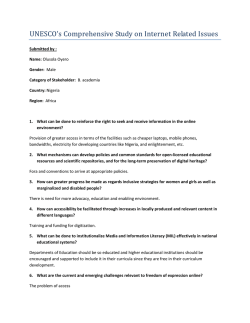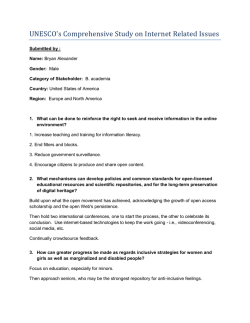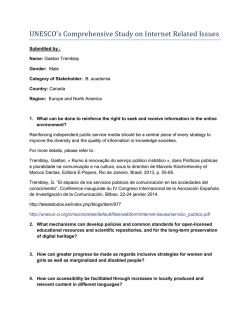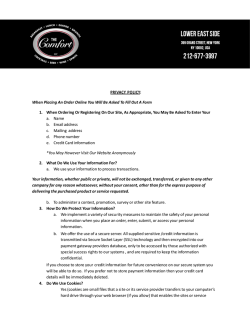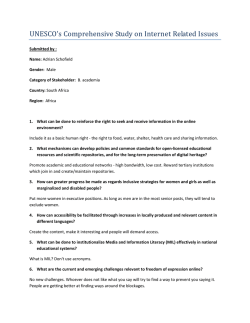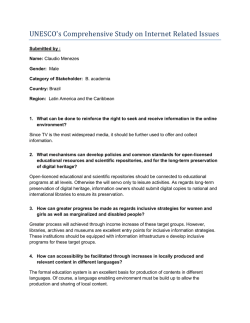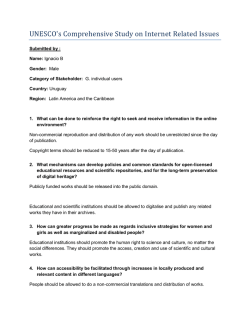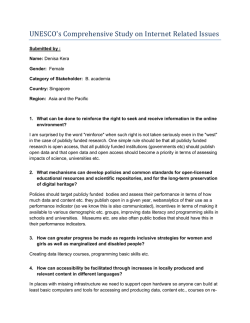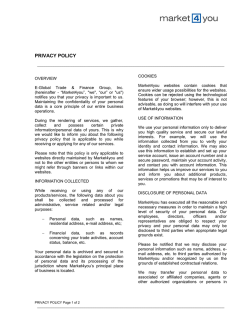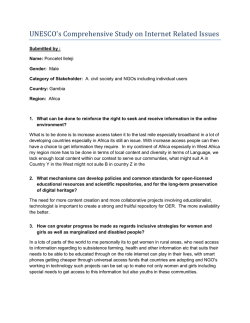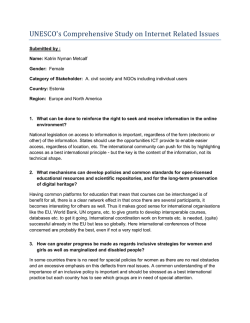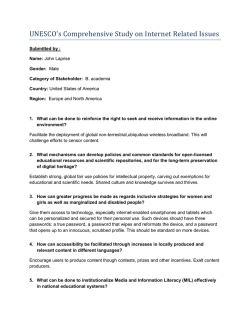
Desislava Manova‐Georgieva, PhD
UNESCO'sComprehensiveStudyonInternetRelatedIssues Submitted by : Name: Desislava Manova‐Georgieva, PhD Gender: Female Category of Stakeholder: B. academia Country: Bulgaria Region: Europe and North America 1. What can be done to reinforce the right to seek and receive information in the online environment? Internet users should be given the possibility to search for information in more sophisticated ways including methods for recognition of their status, interests and professional development. The possibility users to receive just the information needed is also a right that should be further reconsidered. 2. What mechanisms can develop policies and common standards for open‐licensed educational resources and scientific repositories, and for the long‐term preservation of digital heritage? This is a process that should be regulated on a national and international level, involving authors, editors and publishers and providing them with specific guarantees for their authorship and online access. Digitalization of educational resources and scientific repositories is definitely an important step for developing of a new kind of society but also a great challenge because of the enormous financial and technical means required. And its success could be guaranteed only through governmental agreements and constant support on a national and international level. 3. How can greater progress be made as regards inclusive strategies for women and girls as well as marginalized and disabled people? Specific platforms should be developed where these particular communities to be integrated in an online dialogue. Creating such platforms online could be a very good start of a comprehensive campaign including both online and offline mechanisms. 4. How can accessibility be facilitated through increases in locally produced and relevant content in different languages? The use of different languages on the Internet is still one of the biggest challenges, but nevertheless quite important is to be provided content in a variety of languages so that everyone to be given an access to the online environment. New mechanisms for more precise online translation should be elaborated which could further increase the accessibility to content in various languages. 5. What can be done to institutionalize Media and Information Literacy (MIL) effectively in national educational systems? 6. What are the current and emerging challenges relevant to freedom of expression online? In the last years has been made a significant success in terms of securing respect for the right to freedom of expression. This right is implemented through specially constructed mechanisms. But still there are new emerging challenges concerning the global media monopolies and pressures on independent media. 7. How can legislation in a diverse range of fields which impacts on the Internet respect freedom of expression in line with international standards? 8. Is there a need for specific protections for freedom of expression for the Internet? Yes, in sense of users anonymity which should be guaranteed. 9. To what extent do laws protect digitally interfaced journalism and journalistic sources? In Bulgaria this is still quite unsatisfactory and very often there are different kinds of frauds with content and authorship. 10. What are the optimum ways to deal with online hate speech? How can Media and Information Literacy empower users to understand and exercise freedom of expression on the Internet? Hate speech is a factor which could not be eliminated but could be definitely regulated through some internal regulations of each digital platform – forum, blog, etc. Hate speech in |its extreme forms should be banned or strongly restricted. 11. What are the optimum systems for independent self‐regulation by journalistic actors and intermediaries in cyberspace? 12. What principles should ensure respect for the right to privacy? The protection of users’ rights is becoming more challenging than ever, especially in the era of social media. Most often users expose voluntary their personal life on the Internet and this is used constantly by different companies and political parties which could influence them. Of course, there should be principles and norms such as digital signature, pin and tan codes, user names and passwords which to restrict the invasions into our private space on the Web. But the users behavior online matters much more in the sense of privacy and protection of personal data. 13. What is the relationship between privacy, anonymity and encryption? 14. What is the importance of transparency around limitations of privacy? 15. What kinds of arrangements can help to safeguard the exercise of privacy in relation to other rights? 16. How can openness and transparency of data be reconciled with privacy? 17. What may be the impact of issues relating to big data on respect for privacy? 18. How can security of personal data be enhanced? 19. How can Media and Information Literacy be developed to assist individuals to protect their privacy? Special educational methods for Media and Information Literacy should be elaborated which could be used by different Internet users including the kids and adolescents who are mostly affected. These methods should be broadly available and often “reminded” 20. How can ethical principles based on international human rights advance accessibility, openness, and multi‐stakeholder participation on the Internet? 21. What conceptual frameworks or processes of inquiry could serve to analyse, assess, and thereby inform the choices that confront stakeholders in the new social uses and applications of information and knowledge? 22. How does ethical consideration relate to gender dimensions of the Internet? 23. How can ethics, ‐ i.e. the simultaneous affirmation of human rights, peace, equity, and justice ‐ inform law and regulation about the Internet? 24. What international, regional and national frameworks, normative guidelines and accountability mechanisms exist of relevance to one or more fields of the study? 25. How do cross‐jurisdictional issues operate with regard to freedom of expression and privacy? 26. What are the intersections between the fields of study: for example, between access and freedom of expression; ethics and privacy; privacy and freedom of expression; and between all four elements? 27. What pertinent information materials exist that cut across or which are relevant to the four fields of the study? 28. What might be the options for role of UNESCO within the wider UN system in regard to the distinct issues of online Access to information and knowledge, Freedom of Expression, Privacy and Ethical dimensions of the information society? UNESCO should work more intensely in terms of inspiring of public discussions, forums, etc. involving players like Communicators, Online media experts, Decision‐makers and citizens. 29. What might be options for the role of UNESCO in relation to stakeholders outside the UN system? 30. For each study field, what specific options might UNESCO Member States consider?
© Copyright 2026
